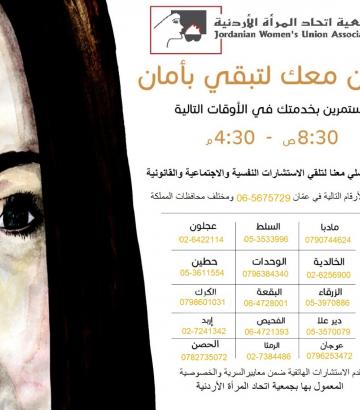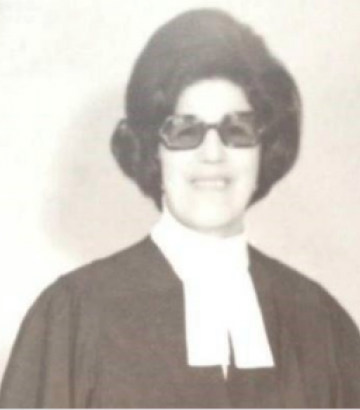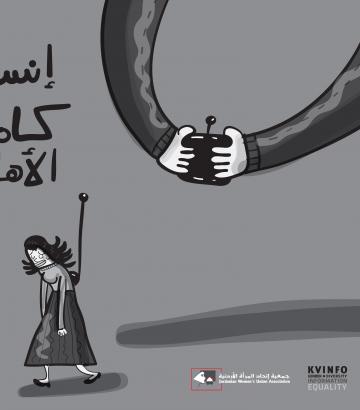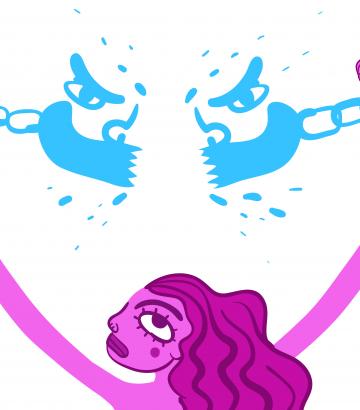The Jordanian Women’s Union has permanent central programs aimed at confronting forms of violence against women, providing protection and assistance to them, and monitoring violations against women, working to provide a legislative and legal environment in which all citizens are equal, with equal rights and duties for men and women. These programs have a central administration in the main center in Amman, and they have branches in most parts of the Kingdom, in coordination with partner associations with the same goals.
Legal, Psychological, and Social (Hot Line) Program
The Hot Line Program was established in 1996 and it seeks to receive women who are abused of gender-based violence and to provide protection along with psychological, social, and legal guiding services, vocational rehabilitation, and training for abused women.
This Program also follows up on the cases of abused women that require moving them and their children to a shelter, providing them with the necessary services, including health care, empowering abused women, and reintegrating them safely into society.
In addition, the Program prepares detailed annual, semi-annual, and periodic reports on the number of abused women who have been dealt with, and employs them in designing plans and developing interventions.
The program's services are not limited to Jordanian abused women but include all resident and refugee women who are subjected to violence in Jordan.
The program is based on a group of experienced and specialized female social and psychological specialists and legal advisors who are trained to provide service and assistance to abused women in complete secrecy and through several mechanisms:
- Over the phone:
Women can request help by calling the Hotline (065675729). Then, the social workers receives the call, listens to the caller, knows the nature of the problem, and then refer her to the psychologist or legal advisor. Then, the social worker continues to provide the necessary assistance according to the desire and decision of the caller and the requirements of solving the problem. The caller can be satisfied with the counseling on the phone, or she can choose to continue communicating with the program, based on her independent decision.
- Service provided through conducting a personal interview:
Where abused women attend the program site in person to get help, it is not required to take an appointment in advance, but according to women’s circumstances and appropriate time, because in some cases, it is difficult for them to leave the house.
Upon the arrival of the woman, the social worker receives and interviews her in accordance with the principles and techniques of work and the code of ethics for social workers, including respect for the dignity and privacy of women as well as paying special attention to their confidential information. The social worker then starts trying to solve the problem, with the participation of the abused women themselves and their agreement to make the decision that suits them.
Sessions continue taking place until possible and safe solutions are reached, and this guarantees the security, protection, and safety of the rights of abused women. Support, training, and intervention continue to be provided as needed. Many women often join training, empowerment, and providing job opportunities programs, if possible, through partners and the local community.
- Field Service:
It is based on the circumstances and needs of abused women who wish to receive the service from the program. This type of service includes:
- Making field visits to the abused women in their places of residence, when their conditions prevent them from accessing the program for various reasons, such as social, financial, and health reasons, among others. Visits are made with the consent of the women themselves in a manner that guarantees their safety and security.
- Visiting governmental and non-governmental institutions, organizations, and bodies that may help in providing or completing the services in order to achieve personal and social security and safety for abused women Such services include security and health institutions, international organizations, embassies, local bodies, and women’s workplaces, among others.
- Visiting the parties that have a relation with the woman’s problem and the violence she is subjected to, including the abuser, in case he refuses to attend.
Services of the Legal, Psychological and Social Hot Line Program are provided through the following centers and branches of the Jordanian Women's Union:
Branch
Phone number/s
Amman
(hotline) 065675729
Irbid
027241342
Ar-Ramtha
027384486
As-Salt
053533996
Al Baqa'a
064728001
Madaba
0779562075
Al-Wehdat
0779560143
Zarqa
0777645353
Kerak
0776478371
Al-Khalidya
0779560194
Ajloun
0775160973
Hittin
0779560185
Deir Alla
0779549658
Emily Bisharat Center for Documentation and Studies
Emily Bisharat Center for Documentation and Studies was established in 2007 with the aim of documenting, entering, and analyzing data related to cases of violence against women, collected from the Guide line and Shelter Programs and from all branches and centers affiliated to it. It also works on monitoring, collecting, preserving, and following up on issues related to women in Jordan from statistical data or information issued by the concerned authorities. The Center also works on documenting the Jordanian women’s movement and its symbols, by collecting, classifying, and indexing documents, data, memos, and letters. Furthermore, it conducted a number of video interviews with some pioneers of the national general feminist work.
Focusing on documenting the history of the movement, as well as the experiences and expertise of many of the movement's pioneers, represents a form of resistance to the processes of exclusion and marginalization that women have experienced over different historical periods.
The Center also seeks to reshape feminist awareness by providing many books, studies, research papers, and training courses. The provision of such sources has already started, and a specialized library has been established.
Moreover, the Center aims to provide data and information to researchers, in order to monitor and understand the fundamental transformations in the conditions of Jordanian women. It also analyzes, interprets, and extrapolates the trends of these transformations in order to bring about a change in the stereotypical view of women and to spread a new feminist culture within the framework of a culture of human rights. Thus, the mechanisms of promoting and respecting women’s rights will be supported, especially the international conventions related to the elimination of violence and discrimination and the removal of all reservations.
The center seeks to achieve its goals through various scientific and cultural activities, which include:
- Holding conferences, symposiums, workshops, and seminars.
- Providing consultancy and technical and information services.
- Holding training courses, issuing bulletins, reports, periodicals, and others.
Documentation in this Center adopts a doctrine based on the international human rights references. In other words, our definition of women’s situations is consistent with what is proposed by international conventions, especially CEDAW. This convention describes the situation of women looking at the key points, namely: actual, practiced, and legal discrimination against women, human rights and their enjoyment, gender roles and stereotypes, political participation, sexuality, education, work, health, economic participation, the situation of rural and Bedouin women and in the camps, and equality before the law.
To this end, the Center seeks to cooperate and integrate with scientific bodies, institutions, and organizations concerned with humans’ and women's rights, either at the national, Arab, or international level, and to exchange experiences in this field.
Institutions we cooperate with are:
1. Relevant governmental and non-governmental organizations.
2. Academics and students of universities, institutes, and schools.
3. Civil society organizations, including women's organizations and associations of children and youth.
4. Employees of the judicial and legislative bodies.
5. Media and journalists.
6. Employees of relevant international institutions.
Abused Women's Guest House (Women's Shelter)
The Shelter was established in 1999, and it was the first shelter for women in Jordan. It is a temporary residence for women (and their children) who have been subjected to violence in all its forms: physical, sexual, material, economic, and psychological violence. It also provides shelter for women who felt threatened and that living in her home poses her and her children to risk. It can be also used by women who were victims of trafficking of women. The shelter, which operates 24 hours a day, receives women mainly from the legal, psychological, and social guide line program to serve abused women and with their desire, free will, and independent decision.
In addition, abused and threatened women are received in the Shelter through referrals from many agencies (governmental agencies, organizations, civil society, international bodies, embassies, consulates), and from activists interested in protecting women from violence. Jordanian women and women of all nationalities who are subjected to violence and threats during their stay in Jordan can be received in the Shelter.
The period of stay in the shelter is not specified, and it can be prolonged or shortened according to several considerations, mainly those related to the extent of danger to which the woman and her children are exposed, the solutions offered, and the prospects that may resolve the crisis.
The idea emerged from placing women in prison in order to provide a safe place for them to live in, after leaving the family house in the absence of alternative safe places that would provide protection for them to reside in. More particularly, the idea was considered because many women who consulted the Guide Line Program encountered violence and danger in their safety and the safety of their children because of living in the same place with the abuser. They were also forced to endure violence no matter how harmful, suffering, and threatening it was because if they decided to leave the place and stay away from the source of the threat, they do not have an alternative place to live safely.
Accordingly, in order to protect women from the danger of violence, work began in the Women's Guest House (the Shelter) according to a feminist and human rights vision and based on the foundations and standards of work that protect the dignity and rights of women residing in the Shelter.
While the abused and threatened women reside in the shelter, many attempts to solve the problems of abused women are made during their stay in cooperation with the relevant parties in the legal, psychological, and social framework. As a result, women would feel more stable and tranquil, and each one of them takes decisions without facing any social or psychological pressure or any form of threat. All legal, psychological, social, and health services, training, and empowerment services are provided. In addition, women are enrolled in cultural and recreational activities, and they acquire skills and raise their capabilities according to their own preferences. All services are provided to women free of charge, at no cost, with great care to respect their dignity, humanity, desires, and needs. These services are also monitored by the Shelter’s administration department and the specialists and counselors who work to provide the service.
Furthermore, services continue to be provided to women after they leave the Shelter and intervene when needed. Abused and threatened women can stay in the Shelter with their children, and they can leave after finding appropriate solutions to their problems and having safe and stable places that provide safety and protection for them and their children. Such solutions shall be in line with the independent desires and decisions of the abused women without interfering with their decision or causing any kind of pressure. Women also shall be assured that they can receive the services and seek help when needed, through the Guide Line Program. They also shall be aware of the importance of continuing communication and follow-up after leaving the Shelter.
Shelter goals:
- Protecting women and their children from violence, danger, and abuse.
- Supporting and encouraging women morally and emotionally to enhance their self-confidence and to enhance their self-assessment.
- Strengthening the motherhood skills and the positive relationship between women and their children and addressing the outstanding and negative issues in this relationship.
- Granting social and legal advice to women and seeking to obtain women's legal and judicial rights.
- Addressing the problems caused by violence in children staying with their mothers in the Shelter, providing them with a better experience, and enhancing their educational and behavioral skills.
Principles of professional work in the Shelter:
- As a basis for its work, The Shelter adopts the feminist thought, which grants women the right to self-determination, as they have full rights to express their feelings and freely take their own decisions in a way that suits their abilities and circumstances.
- We deal with women’s rights for being, first and foremost, human rights, and we spread this message at every opportunity through meetings with members of society and families. We also strive to help women change their self-perception of their human rights and women’s rights, as a citizen, and as a mother.
- We also follow the principle of transparency in dealing with women who are received in the Shelter, and we let them be fully involved in anything that arises during the professional intervention. We are also keen to confront every attempt made by any party or element to take custody of them.
On the other hand, we believe in realism at work and in the importance of communication and coordination with the external environment and other surroundings.
- In addition, we believe in the principle of equality, and that the social value that negatively characterizes women and entrenches their inferiority is totally rejected. Therefore, we bear in mind the ambition to reach radical changes regarding the stereotypical society and the way families treat women, because they deserve to equally get their rights, and because they can decide their own fates and decide their own future.
We, in the Jordanian Women's Union, believe in the right of women and their children to live without violence. Therefore, the most important, first, and most prominent rule followed in the Shelter, at all levels, is the rejection of violence in all its forms. Accordingly, we are keen that all practices and methods of communication and dealing with the cases in the Shelter are free of coercion and violence, but rather on the principles of respect, dialogue, and acceptance.
We work according to our belief in the right of women and their children to get protection and live a safe life. Therefore, we are constantly working to take all necessary measures to provide protection and safety for women and children inside and outside the Shelter.
We also reject to blame women and consider them guilty, because they are the victims and they are not responsible for what happened, what is happening, and what is caused by the one who committed violence. They are also not blamable for running away from their homes to the Shelter, or because they filed a complaint with the police. Overall, we work in all cases out of respect for the principles of privacy and confidentiality.
Crew working at the Shelter:
The Shelter consists of the Shelter director who works 24 hours a day in her emergency shift, the treatment staff which consists of social workers for women and children, lawyers to give advice and legal representation to women, in addition to the maintenance staff, secretarial and office workers, people who are responsible for organizing pedagogical and educational activities for children, and volunteers.
Child Guest House and Family Counseling
Since the establishment of the Child Guest House and Family Counseling in 1996, it has assumed an important role that is reflected on the child, family, and society. The Child Guest House is a temporary place to receive separated and divorced parents to see their children, in accordance with the decisions taken by the Sharia courts that stipulates the entitlement of the non-custodial party to see his/her children. It is important to mention that visitations, before establishing the Child Guest House, were taking place in security centers or in the corridors of the courts. This caused family and societal reluctance and retreat in dealing with the matter. It also resulted in having cold relationships and a feeling of anxiety and discomfort that negatively affects all parties.
However, the situation has clearly and tangibly changed after establishing a safe and comfortable place that takes care of psychological, health, and social aspects. The most important point is that this idea improved children’s acceptance, and it has positive reflections on their relationship with their parents. Furthermore, in many cases, the spark to strengthen the relationship between separated and divorced couples was kindled in a friendly and flexible manner.
For this reason, Child Guest House is considered one of the most important programs in the Jordanian Women's Union. This is what prompted the Union to open a Child Guest House in every governorate that has a branch. Accordingly, more than 8000 decisions of visitations have been handled.
At the head of each branch of the Guest House, there is a staff headed by a Manager with a specialized, qualified, and trained team of social workers/ psychologists, counselors, and legal advisers. There is also a policewoman wearing civilian clothes to give an additional feeling of comfort. This policewoman is delegated from the security center, and the Union works to spread the idea of having a policewoman wearing civilian clothes to all Child Guest House Branches.
Moreover, there is a voluntary committee (support committee) that aims to support the program’s staff in family counseling sessions, whether it is to restore a married life or to transform a case into the home. This committee also organizes leisure activities such as trips, bazaars, competitions, and celebrations for Mother’s Day and Family Day, in coordination with the Executive Director.
Another task that the guest house staff does is conducting joint or individual sessions, in order to give families the skill of dialogue for resolving disputes and family disputes, as well as the skill of gaining trust between divorced people and helping them to soundly raise their children.
Health clinic
The idea of establishing the Reproductive Health Clinic came in 2008, to continue the series of legal, psychological, and social services provided by the Jordanian Women’s Union to abused women, especially women residing in the women’s shelter. The clinic aims to provide the necessary medical and treatment services as well as needed medicines. At first, the clinic had a doctor and a nurse, and it was a small clinic. After that, the clinic's services expanded to cover employees who have health insurance, and it was approved by the health insurance. In addition, a clinic was opened in each of the two branches of the Union, in Irbid and Zarqa.
Then, the health services system and department expanded in the clinics of the central branch in Amman and the branches of Irbid and Zarqa. Accordingly, it started to provide integrated health services by launching health projects funded by various international organizations, such as most notably, the Reproductive Health Project funded by UNFPA for Syrian refugees and the local community.
The most prominent services are:
- Follow-up of pregnancy, post-birth cases ,and newborn babies, and providing the necessary treatments, advice and examinations.
- Providing the necessary laboratory tests free of charge by contracting with a medical laboratory.
- Providing x-rays by contracting with x-ray centers.
- Conducting awareness lectures on issues related to reproductive health and sexual education, focusing on the usefulness of lectures that tackle the importance of early detection of breast cancer, and making mammograms for the target groups.
- And other services provided by health clinics.
Furthermore, there is a general medical clinic that provides various medical and treatment consultations and provides some medicines for free. These free medicines are obtained from donors, whether they are individuals or health institutions.
The clinic also cooperates and maintains networking with other local community institutions to get mutual benefits and to provide the best possible services to the beneficiaries.
The clinic also organizes free medical days, especially in remote and marginalized areas, in cooperation with international medical organizations and missions such as (AHR) and (SAMS).
The clinic also trains medical staff on the cases they deal with most of the time, such as various reproductive health cases, to build their capabilities and enable them to deal with such cases.
Health clinics also participate in many activities such as workshops and conferences and respond to various invitations to participate and cooperate with other sectors, whether governmental or non-governmental, within the Kingdom and in various health fields, such as the Ministry of Health, Doctors without Borders, and UNICEF.



